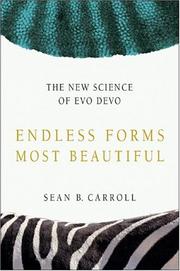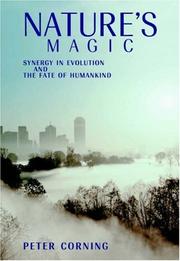Book
ISBN: 1316981606 1316984192 1316550176 Year: 2017 Publisher: Cambridge, England : Cambridge University Press,
Abstract | Keywords | Export | Availability | Bookmark
 Loading...
Loading...Choose an application
- Reference Manager
- EndNote
- RefWorks (Direct export to RefWorks)
Humans and flies look nothing alike, yet their genetic circuits are remarkably similar. Here, Lewis I. Held, Jr compares the genetics and development of the two to review the evidence for deep homology, the biggest discovery from the emerging field of evolutionary developmental biology. Remnants of the operating system of our hypothetical common ancestor 600 million years ago are compared in chapters arranged by region of the body, from the nervous system, limbs and heart, to vision, hearing and smell. Concept maps provide a clear understanding of the complex subjects addressed, while encyclopaedic tables offer comprehensive inventories of genetic information. Written in an engaging style with a reference section listing thousands of relevant publications, this is a vital resource for scientific researchers, and graduate and undergraduate students.
Flies --- Human anatomy. --- Anatomy, Comparative. --- Homology (Biology) --- Evolutionary developmental biology. --- Anatomy.

ISBN: 0393060160 9780393327793 0393327795 9780393060164 Year: 2006 Publisher: New York, N.Y. W.W. Norton & Company
Abstract | Keywords | Export | Availability | Bookmark
 Loading...
Loading...Choose an application
- Reference Manager
- EndNote
- RefWorks (Direct export to RefWorks)
Evo Devo is evolutionary developmental biology, the third revolution in evolutionary biology. The first was marked by the publication of The Origin of Species. The second occurred in the early twentieth century, when Darwin's theories were merged with the study of genetics. Now the insights of Evo Devo are astonishing the biology world by showing how the endless forms of animals-butterflies and zebras, trilobites and dinosaurs, apes and humans, are made and evolved. Perhaps the most surprising finding of Evo Devo is the discovery that a small number of primitive genes led to the formation of fundamental organs and appendages in all animal forms. The gene that causes humans to form arms and legs is the same gene that causes birds and insects to form wings, and fish to form fins; similarly, one ancient gene has led to the creation of eyes across the animal kingdom. Changes in the way this ancient tool kit of genes is used have created all the diversity that surrounds us. Sean Carroll is the ideal author to lead the curious on this intellectual adventure-he is the acknowledged leader of the field, and his seminal discoveries have been featured in Time and The New York Times.
Developmental genetics --- Evolutionary genetics --- Animal genetics. Animal evolution --- Philosophy of nature --- Evolution. Phylogeny --- Evolutionary developmental biology --- Developmental genetics - Popular works --- Evolutionary genetics - Popular works --- Evolutionary developmental biology - Popular works
Book
ISBN: 3031310233 3031310225 Year: 2023 Publisher: Cham : Springer International Publishing : Imprint: Springer,
Abstract | Keywords | Export | Availability | Bookmark
 Loading...
Loading...Choose an application
- Reference Manager
- EndNote
- RefWorks (Direct export to RefWorks)
The book discusses ideas concerning the order and balance of nature (or "economy of nature") from the late 17th century to the early 20th century. The perspective taken is broad, longue durée and interdisciplinary, and reveals the interplay of scientific, philosophical, moral and social ideas. The story begins with natural theology (dating roughly to the onset of the so-called Newtonian Revolution) and ends with the First World War. The cut-off date has been chosen for the following reasons: the war changed the state of things, affecting man’s way of looking at, and relating to, nature both directly and indirectly; indeed, it put an end to most applications of Darwinism to society and history, including interpretations of war as a form of the struggle for existence. The author presents an overview of the different images of nature that were involved in these debates, especially in the late 19th century, when a large part of the scientific community paid lip service to ‘Darwinism’, while practically each expert felt free to interpret it in his own distinct way. The book also touches on the so-called ‘social Darwinism’, which was neither a real theory, nor a common body of ideas, and its various views of society and nature’s economy. Part of this book deals with the persistence of moralizing images of nature in the work of many authors. One of the main features of the book is its wealth of (detailed) quotations. In this way the author gives the reader the opportunity to see the original statements on which the author bases his discussion. The author privileges the analysis of different positions over a historiography offering a merely linear narrative based on general implications of ideas and theories. To revisit the concept of the so-called "Darwinian Revolution", we need to examine the various perspectives of scientists and others, their language and, so to speak, the lenses they used when reading "facts" and theories. The book ends with some general reflections on Darwin and Darwinisms (the plural is important) as a case study on the relationship between intellectual history, the history of science and contextual history. Written by a historian, this book really gives new, multidisciplinary perspectives on the "Darwinian Revolution.".
Evolution (Biology). --- Science --- Philosophy of nature. --- Biotic communities. --- Population biology. --- Evolutionary developmental biology. --- Evolutionary Theory. --- History of Science. --- Evolutionary Biology. --- Philosophy of Nature. --- Community and Population Ecology. --- Evolutionary Developmental Biology. --- History.

ISBN: 9780521825474 9780511546426 9781107407503 Year: 2003 Publisher: Cambridge Cambridge University Press
Abstract | Keywords | Export | Availability | Bookmark
 Loading...
Loading...Choose an application
- Reference Manager
- EndNote
- RefWorks (Direct export to RefWorks)
Book
ISBN: 9780199671427 0199671435 9780199671434 0199671427 Year: 2014 Publisher: Oxford, United Kingdom: New York, NY, United States of America: Oxford University Press,
Abstract | Keywords | Export | Availability | Bookmark
 Loading...
Loading...Choose an application
- Reference Manager
- EndNote
- RefWorks (Direct export to RefWorks)
Is it possible to explain and predict the development of living things? What is development? Answers to these innocuous questions are far from straightforward. To date, no systematic, targeted effort has been made to construct a unifying theory of development. This text offers a unique exploration of the foundations of ontogeny by asking how the development of living things should be understood. It explores the key concepts of developmental biology, asks whether general principles of development can be discovered, and examines the role of models and theories. This book analyses a wealth of approaches to concepts, models and theories of development, such as gene regulatory networks, accounts based on systems biology and on physics of soft matter, the different articulations of evolution and development, symbiont-induced development, as well as the widely discussed concepts of positional information and morphogenetic field, the idea of a 'programme' of development and its critiques, and the long-standing opposition between preformationist and epigenetic conceptions of development. --
Developmental biology --- Evolutionary developmental biology --- Life (Biology) --- Evolution (Biology) --- Embryology --- Life cycle, Human --- Developmental Biology --- Biological Evolution
Book
Abstract | Keywords | Export | Availability | Bookmark
 Loading...
Loading...Choose an application
- Reference Manager
- EndNote
- RefWorks (Direct export to RefWorks)
ECO Ecology --- evolutionary biology --- evolutionary ecology --- evo-devo (evolutionary developmental biology) --- population ecology --- genetics --- genomics --- phylogeny --- ontogeny --- university level ( higher education )
Book

Year: 2011 Publisher: Genève CJB
Abstract | Keywords | Export | Availability | Bookmark
 Loading...
Loading...Choose an application
- Reference Manager
- EndNote
- RefWorks (Direct export to RefWorks)
education --- didactics --- primary and secondary school level --- guide books --- evo-devo (evolutionary developmental biology) --- evolutionary biology --- history of biology --- history of botany --- history of plants --- children's books
Book

ISBN: 9782827702527 Year: 2012 Publisher: Genève CJB
Abstract | Keywords | Export | Availability | Bookmark
 Loading...
Loading...Choose an application
- Reference Manager
- EndNote
- RefWorks (Direct export to RefWorks)
education --- didactics --- primary and secondary school level --- guide books --- evo-devo (evolutionary developmental biology) --- evolutionary biology --- history of biology --- history of botany --- history of plants --- children's books
Book
Year: 1989 Publisher: New York New York University Press
Abstract | Keywords | Export | Availability | Bookmark
 Loading...
Loading...Choose an application
- Reference Manager
- EndNote
- RefWorks (Direct export to RefWorks)
HIS History & Biographies --- history of botany --- darwinism --- natural selection --- evo-devo (evolutionary developmental biology) --- variability --- flower morphology --- floral biology --- reproductive biology
Book
ISBN: 9780520271395 9781138055742 0520271394 1138055743 Year: 2022 Publisher: Boca Raton: CRC Press, Taylor & Francis Group,
Abstract | Keywords | Export | Availability | Bookmark
 Loading...
Loading...Choose an application
- Reference Manager
- EndNote
- RefWorks (Direct export to RefWorks)
The complex idea of "species" has evolved over time, yet its meaning is far from resolved. This comprehensive work takes a fresh look at an idea central to the field of biology by tracing its history from antiquity to today. John S. Wilkins explores the essentialist view, a staple of logic from Plato and Aristotle through the Middle Ages to fairly recent times, and considers the idea of species in natural history-a concept often connected to reproduction. Tracing "generative conceptions" of species back through Darwin to Epicurus, Wilkins provides a new perspective on the relationship between philosophical and biological approaches to this concept. He also reviews the array of current definitions. Species is a benchmark exploration and clarification of a concept fundamental to the past, present, and future of the natural sciences.
HIS History & Biographies --- history of biology --- species concept --- species --- species question --- evo-devo (evolutionary developmental biology) --- darwinism --- Species - History --- Species - Philosophy

 Search
Search Feedback
Feedback About UniCat
About UniCat  Help
Help News
News